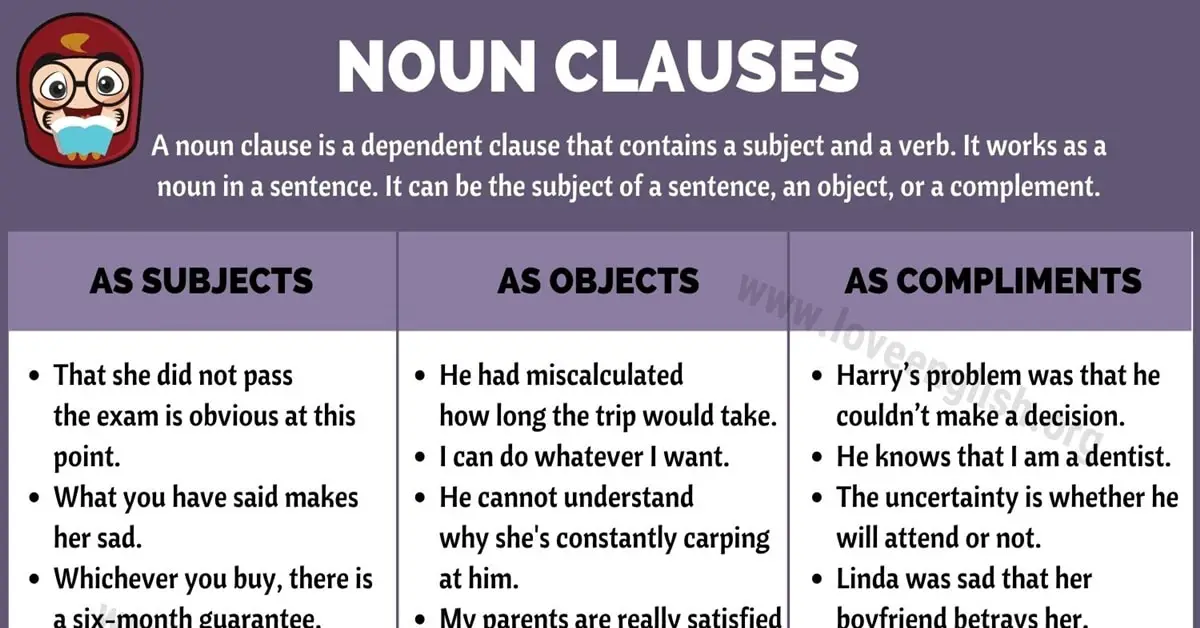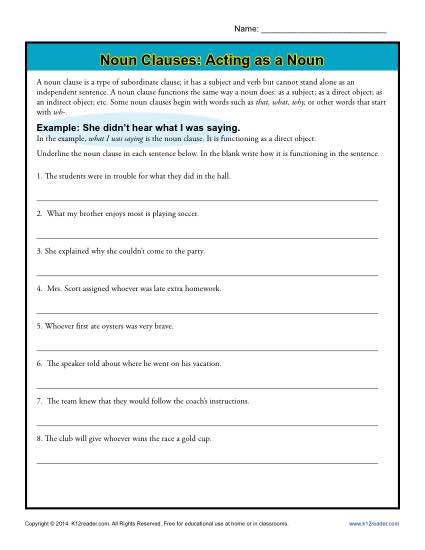Noun Clause | In this lesson, we'll look at the dependent clause and its. A noun clause is a dependent clause that contains a subject and a verb. A noun clause is a dependent clause that works as a noun in a sentence. Relative clause / adjective clause. Examples and definition of a noun clause. There are instances wherein we would like to name something but a lone word. A clause used as a part of speech is called a subordinate clause. A noun clause is a dependent clause that consists of a subordinating conjunction followed by a clause and that performs a nominal function. Noun clauses are a type of subordinate clause. Yani cümlenin öznesi olabilir, fiilin veya bir edatın nesnesi olarak kullanılabilir. A noun clause cannot stand alone since it does not express a complete thought. A clause used as a part of speech is called a subordinate clause. A noun clause is a dependent clause that contains a subject and a verb. A noun clause, like other clauses, is a group of words that includes a subject and a verb. Nouns can function as subjects, direct objects, indirect objects, object. A noun clause is a dependent clause that consists of a subordinating conjunction followed by a clause and that performs a nominal function. It might be a noun clause. Mia told him that she would go out. It can be the subject of a sentence, an object, or a complement. A noun clause refers to a clause that serves the same purpose as a noun and is usually dependent. Having trouble finding the subject or object in a sentence? Noun clauses describe something about the verb or the sentence. A noun clause is a dependent clause that works as a noun in a sentence. Examples and definition of a noun clause. Noun clauses begin with words such as how, that, what, whatever, when, where, whether, which, whichever, who, whoever, whom, whomever. It can be the subject of a sentence, an object, or a complement. A noun clause cannot stand alone since it does not express a complete thought. As the object of a verb, including the object of an. A noun clause is a clause that functions as a noun. Noun clauses (isim cümlecikleri) bir cümlede bir noun (isim) gibi kullanılabilir. Like all clauses, a noun clause has a subject and a verb. It can be the subject of a sentence, an object, or a complement. A noun clause refers to a clause that serves the same purpose as a noun and is usually dependent. It works as a noun in a sentence. Noun clauses are clauses that function as nouns. A clause is a group of words that forms part of a sentence and that contains a subject and a predicate. Just like nouns do, a noun clause names people, things, places, and ideas. A noun is the name of a person, place, thing, or idea. A subject complement says something about the subject. Start by looking at a sentence and trying to find a dependent clause. There are instances wherein we would like to name something but a lone word. A noun clause is a dependent clause that consists of a subordinating conjunction followed by a clause and that performs a nominal function. Noun clauses will contain a subject and a verb, but they cannot stand alone in a sentence. A noun clause is a clause that plays the role of a noun in a sentence. Noun clauses as a direct object: Having trouble finding the subject or object in a sentence? Subject complements provide a further description,\ or clarification of a subject. It can be the subject of a sentence, an object, or a complement. As a noun clause does the work of a noun, it can be subject to a sentence, object of a transitive verb, object of a preposition, apposition to a noun, or complement to a linking verb. A clause used as a part of speech is called a subordinate clause. A noun clause is a dependent clause that acts as a noun. A noun clause is a dependent clause that consists of a subordinating conjunction followed by a clause and that performs a nominal function. Noun clauses are clauses that function as nouns. A noun clause is a dependent clause that works as a noun in a sentence. They're cool because the whole clause acts as a what are noun clauses? Like all clauses, a noun clause has a subject and a verb. Yani cümlenin öznesi olabilir, fiilin veya bir edatın nesnesi olarak kullanılabilir. Since it is a dependent clause, it can't stand on its own and give a complete meaning. A subject complement says something about the subject.


Noun Clause: Examples and definition of a noun clause.
0 Comment:
Post a Comment